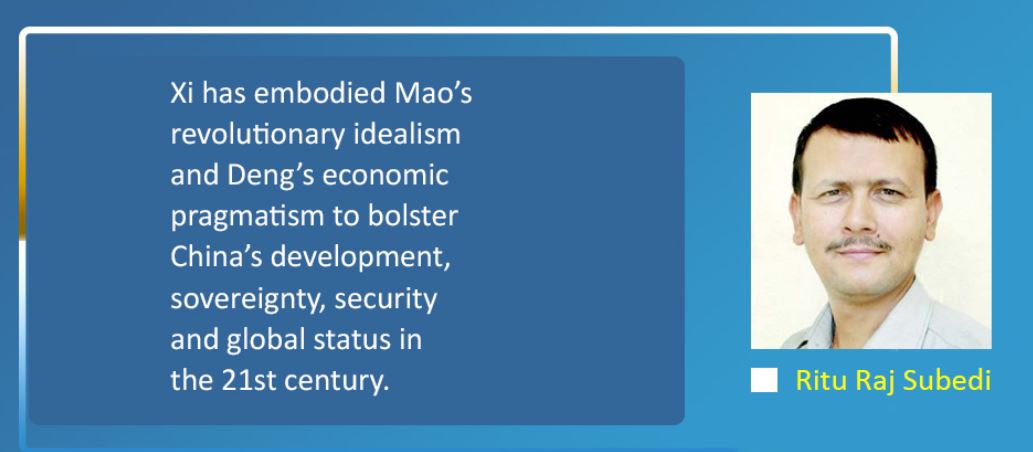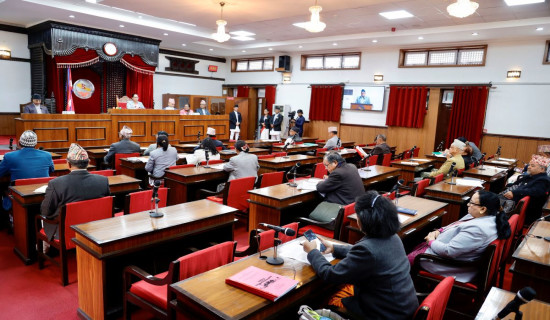- Friday, 6 February 2026
CPC Centenary Journey Of Trials, Tribulations & Feats
In the West, communism is long dead but enormous success of the Communist Party of China (CPC) shows that when Marxism is adapted to the national realities, it becomes a reliable ideological instrument to emancipate as well as bring prosperity to a society battered by feudalism, bureaucratic capitalism and foreign aggression. The salvos of Russian October revolution in 1917 brought Marxism-Leninism to China, inspiring early Chinese progressives to establish CPC in 1921 in a quest for liberation and happiness of their people.
However, Marxism-Leninism was indigenised to suit the Chinese characteristics, culture and civilisation spanning 5,000 years. It underwent massive theoretical modifications at the hands of top-notch Chinese leaders ranging from Chairman Mao Zedong, Deng Xiaoping to Xi Jinping. Unlike the dogmatic Russian communist leaders, the CPC leaders adopted a pragmatic approach to application of communism to deliver stunning political and economic results to their nation. On July 1, the CPC has completed its journey of 100 years, which does not only mark its rare feat in human history but also challenges the supremacy of Western liberal democracy that is creaking under the weight of economic crisis, COVID-19 pandemic and hubris of hegemony.
Sacrifices
Most part of CPC’s story of 100 years is the story of trials and tribulations. Hundreds of thousands of peasants, communist cadres and Red Army soldiers had sacrificed on the altar of revolution. They fought tooth and nail against the local feudal lords, the army of Chiang Kai-shek and Japanese invaders. The Chinese were able to put their ‘century of humiliation’ behind only when the CPC engineered a New Democratic revolution under Mao Zedong, establishing the People’s Republic of China (PRC) in 1949.
While proclaiming the PRC from the top gate of the Tiananmen Square on October 1, 1949, Mao had proudly said: “The Chinese people have stood up.” It was the political victory of CPC that would confront bigger challenge of transforming the poor, backward and vast China into strong, stable and rich nation. Mao led CPC to liberate China from civil war and political chaos while Deng brought unprecedented economic development through his famous reform and opening-up policy. Upon the political and economic foundation built by Chairman Mao and paramount leader Deng, incumbent CPC general secretary and President Xi Jinping made China stronger with his miraculous poverty alleviation programmes and anti-corruption drive.
The CPC has embraced Deng’s political and economic ideology that is socialism with Chinese characteristics in which socialist market economy remains the defining policy in domestic and foreign investment, capital accumulation, trade and technological innovation. Xi has further enriched Deng’s ideological content with Xi Jinping Thought on Socialism with Chinese Characteristics for a New Era that has been enshrined in the country’s constitution. Apparently, Xi has embodied Mao’s revolutionary idealism and Deng’s economic pragmatism to bolster China’s development, sovereignty, security and global status in the 21st century.

China has become the second largest economy and is set to overtake the US by 2027. President Xi has launched landmark Belt and Road Initiative (BRI), a massive transcontinental connectivity and infrastructure project, linking over 100 nations via roads, railways and sea routes. The BRI is considered a global development strategy to realise Xi’s vision of ‘building a community of shared future of humanity.’ He also proved his leadership mettle by successfully controlling the COVID-19 pandemic in China and supplying Chinese anti-COVID-19 vaccines to more than 90 countries. He has called for making vaccines as the global public good, an idea the leaders of Western liberal democracies are failing to live up to as the world is reeling from the havoc wrought by coronavirus disease and resulting economic recession.
In mid-1930s, Mao had led arduous Long March to escape the rightist offensive of Chiang Kai-shek. Guided by the peasant-based guerrilla warfare strategy of Mao, the Long March did not only catapult him into an undisputed leader of CPC, it eventually sealed a decisive victory against imperialism and Chiang’s Nationalist forces, laying the foundation for new Chinese nation. Almost a century later, China has witnessed an era of enduring peace, fast economic growth and its growing influence on international stage. Now its ‘Long March’ is headed beyond earth - outer space, Moon and Mars.
Pro-poor policy
On July 1, President Xi announced from the same podium of Tiananmen Square where Mao had proclaimed the PRC that has become a moderately prosperous society in all respects and was now marching in confident strides toward the second centenary goal of building China into a great modern socialist country in all respects to fulfil the Chinese dream of national rejuvenation. This spectacular achievement became possible with the pro-poor policy being executed by visionary, committed and action-oriented political leadership. There are no Chinese people living in absolute poverty now. Since 1978 more than 850 million people have been lifted out of extreme poverty. Now average life expectancy has doubled to almost 80. The communist and non-communist parties across the world can learn from the Chinese experiences to fight poverty, corruption and pandemic.
In 1921, the CPC had only 50 members. Now it has become the world’s largest party with more that 95 million members, leading a country of more than 1.4 billion people. Many communist parties across the world had failed to thrive and lead their nation to stability and prosperity in the absence of correct policy and practice, and dynamic leadership. The secret behind the CPC’s historic success is its members’ unswerving commitment to its motto ‘serving the people’ inscribed in its logo. It has continued to strengthen its capacity to ‘conduct sound, democratic, and law-based governance’ to materialise its original aspirations of people’s happiness.
Xi said: “On the journey ahead, we must rely closely on the people to create history. We will stand firmly with the people, implement the Party’s mass line, respect the people’s creativity, and practice a people-centred philosophy of development.” Do Nepali communist parties take their cue from the CPC to enhance the living standards of people and usher the nation into an era of stability and prosperity?
(Deputy Executive Editor of The Rising Nepal, Subedi writes regularly on politics, foreign affairs and other contemporary issues. subedirituraj@yahoo.com)

















